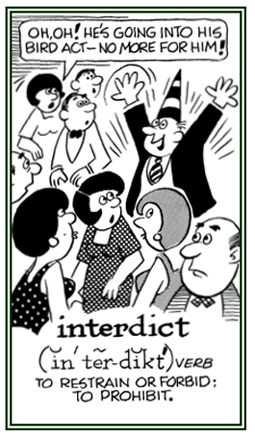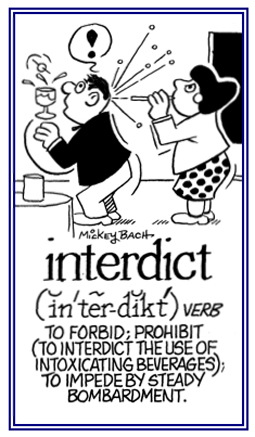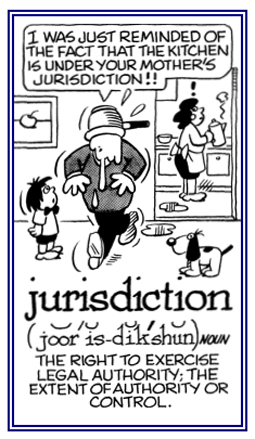dic-, dict-
(Latin: talk, speak, say, tell, declare; to proclaim)
1. The action of ordaining or announcing authoritatively and publicly; an appointment, a declaration, or a proclamation: "The indiction of the mayor was held at an outdoor ceremony so a large number of people could attend."
2. The decree or proclamation of the Roman Emperors fixing the valuation on which the property-tax was assessed at the beginning of each period of fifteen years; hence, the tax or subsidy paid on the basis of this assessment: "The emperor issued a new indiction in order to increase his revenue which would be used for building monuments."
2. The decree or proclamation of the Roman Emperors fixing the valuation on which the property-tax was assessed at the beginning of each period of fifteen years; hence, the tax or subsidy paid on the basis of this assessment: "The emperor issued a new indiction in order to increase his revenue which would be used for building monuments."
1. A gathering of a dozen or more individuals within the context of a court to determine whether there is sufficient evidence to proceed with a prosecution: "The legal team of Wilson and Smith presented the indictment to the grand jury to see if there will be sufficient evidence to proceed with a full court procedure."
"Without the assessment of the grand jury, the lawyers were not sure they could bring an indictment against the bank managers for defrauding the customers."
2. An expression or a declaration of strong disapproval: "As the producer, Susan intended the film to be an indictment of the corruption that was going on by government officials."
indite (verb), indites; indited; inditing
1. To write, to produce, or to compose, a literary work; such as, a poem, a letter, or a speech: "The mayor hired a new person to indite her speeches."
2. To treat in a literary composition: "The poet was planing to indite a new poem praising the beauty of the new fountain that had been constructed for the city."
3. Etymology: from Latin in-, "toward" + dictare, "to declare, to compose".
2. To treat in a literary composition: "The poet was planing to indite a new poem praising the beauty of the new fountain that had been constructed for the city."
3. Etymology: from Latin in-, "toward" + dictare, "to declare, to compose".
A document prepared for the court outlining legal charges against someone for a crime, typically prepared by the prosecution regarding an individual or organized groups accused of illegal activities: "Mr. Solice had a reputation of preparing remarkable inditements during the course of his long legal career."
Someone who writes, composes, or gives formal expressions of ideas, etc.: "Samuel Smith was a famed inditer for the local university."
injudicious (adjective), more injudicious, most injudicious
Lacking, or showing a lack of proper consideration or discretion; unwise; imprudent; indiscreet: In was an injudicious decision of the hikers to attempt to cross the frozen lake because of the unforeseen spots of thin ice over parts of the water.
injudiciously (adverb), more injudiciously, most injudiciously
Conveying a lack of common sense: Hans injudiciously made an inappropriate comment about his employer during the coffee break at work.
1. An authoritative prohibition: "People heard the latest interdict from the leader of the revolution on the radio at midnight, prohibiting people to be on the streets after sundown."
2. In the Roman Catholic Church, an authoritative sentence debarring a particular place or person (especially, the former) from ecclesiastical functions and privileges: "The priest who was being investigated by the police was under an interdict from the archbishop and could no longer participate in the rites of the church until the findings of the investigation were concluded."
2. In the Roman Catholic Church, an authoritative sentence debarring a particular place or person (especially, the former) from ecclesiastical functions and privileges: "The priest who was being investigated by the police was under an interdict from the archbishop and could no longer participate in the rites of the church until the findings of the investigation were concluded."
interdict (verb), interdicts; interdicted; interdicting
To declare authoritatively against doing or using something; to forbid, to prohibit; to debar or preclude by or as by a command: The owner of the dog strongly interdicted the animal against chasing cars that were driving by on the street.

© ALL rights are reserved.

© ALL rights are reserved.
Go to this Word A Day Revisited Index


Go to this Word A Day Revisited Index
so you can see more of Mickey Bach's cartoons.
1. The action of forbidding by or as by authority; authoritative or peremptory prohibition: "The government official issued an interdiction that would forbid dog owners from allowing their pets to wander the streets.
2. The interruption of supply operations by aerial bombing: "As a result of the bombing by enemy forces, there was an interdiction of supplies to the city and the residents were slowly starving.
2. The interruption of supply operations by aerial bombing: "As a result of the bombing by enemy forces, there was an interdiction of supplies to the city and the residents were slowly starving.
interdictory (adjective), more interdictory, most interdictory
1. A reference to that which is forbidden, usually in a formal or an authoritative manner: "Peanuts and peanut products are on the interdictory list of items that may be served at the hospital due to the high risk of allergic reactions."
2. Pertaining to, or noting, a prohibition: "The king gave a very interdictory speech explaining why he was no longer allowing the export of grain to a specific country."
2. Pertaining to, or noting, a prohibition: "The king gave a very interdictory speech explaining why he was no longer allowing the export of grain to a specific country."
1. An area or the extent or range in which legal authority or power is exercised: The courts have jurisdiction not only over their own legal citizens, but also over foreigners who are living in their country as well.

© ALL rights are reserved.
Go to this Word A Day Revisited Index
Jurisdiction is an exercise of judicial authority, or of the functions of a judge or legal tribunal, having the power of declaring and administering law or justice and who have legal authority or power.
2. Etymology: from Old French jurediction; from Latin jurisdictio(n); from jus, jur, "law" + dictio "saying"; from dicere, "to say".

Go to this Word A Day Revisited Index
so you can see more of Mickey Bach's cartoons.
jurisdictive (adjective), more jurisdictive, most jurisdictive
Referring to the right, power, or authority to administer justice by hearing and determining controversies: "The jurisdictive authority of the municipal courts applied not only to traffic violations, but also to more serious crimes."
maledict (verb), maledicts; maledicted; maledicting
To utter or to verbally express harsh words or obscenities against a situation or at someone: The supervisor was very upset and he could be heard maledicting some members of his staff because he was convinced that they were incompetent in taking care of a supply problem.
maledicted (adjective), more maledicted, most maledicted
Referring to something which or someone who is spoken of in an evil manner or accursed: Sharon's boss was heard using maledicted words when a technician accidentally knocked a new computer off the desk as it was being installed.
Cross references of word families related directly, or indirectly, to: "talk, speak, speech; words, language; tongue, etc.":
cit-;
clam-;
fa-;
-farious;
glosso-;
glotto-;
lalo-;
linguo-;
locu-;
logo-;
loqu-;
mythico-;
-ology;
ora-;
-phasia;
-phemia;
phon-;
phras-;
Quotes: Language,Part 1;
Quotes: Language, Part 2;
Quotes: Language, Part 3;
serm-;
tongue;
voc-.


